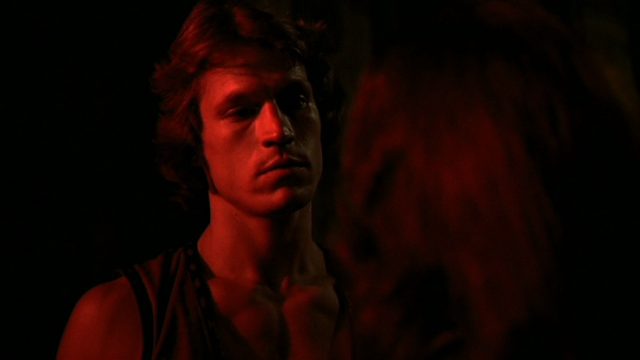Walter Hill’s The Warriors, like his later Streets of Fire, is a kind of violent, neon-streaked folklore. Streets of Fire pushes this idea further, even making its status as a fable explicit, but The Warriors is the necessary prelude. Its New York street gangs travel through a kind of dark fantasia on a homeward bound quest that feels as epic as The Odyssey but more natural and contemporary than most of The Odyssey‘s imitators. This isn’t homage; it’s grimy modern myth-making that feels like it sprang up on its own from these dark and dirty streets.
Like most fairy tales, it’s a weird and nearly unworkable blend of harsh simplicity and strange flourishes. Representatives from dozens of New York gangs attend a crowded rally with the fervor of a tent revival; their host is Cyrus, a powerful gang leader who’s both prophet and revolutionary and who’s selling them a funky inverse of most political promises. Start with peace, and he promises it’ll lead to violence and a stranglehold of control. If the gangs stop fighting each other and organize against the cops, they’ll hold the whole city. It’s the kind of imaginative, world-ending, bloodily utopian sentiment that tends to get people killed, but it’s not the cops who take out Cyrus. It’s Luther, another gang leader, this one with a Cheshire cat smile and a wild air of menace. He kills Cyrus just because–the kind of act, and kind of person, to bring most ideal plans crashing down.
To cover himself, Luther throws the blame on The Warriors, who have come to the summit from Coney Island. Now Cyrus’s gang has put a hit out on them–conveyed to the tuned-in world via a coy, velvet-voiced deejay–and they have to get from the Bronx all the way back to their own territory. They don’t have money or allies or guns. It might save their lives to take their Warriors jackets off, but which of them would even think of stripping off his identity like that?
The Warriors aren’t all that likable, and that’s one of the movie’s triumphs. Epic heroes are great, not good; they have the defining virtues and strengths of their world and usually of their world only, so war chief Swan (Michael Beck) is tough, hard as nails, clannish, and capable. He can see a little further than his own context, but not far enough for you to ever be sure he’ll escape it. When he slowly falls into a kind of worn-out, desperate romance, it should feel cheap, but it doesn’t, mostly because it’s love without sentiment.
The world The Warriors move through is even more important–and considerably and appropriately better-realized–than they are. It’s a New York of stylized gangs: mimes, Baseball Furies in pinstripes and painted faces, grubbily dressed Orphans who don’t even get invited to the game-changing summit. Their landscape–what they interact with and let themselves see–is 90% gangs, 7% cops and other enemies like transit authority, and only 3% civilians. (Even one of the seeming civilians turns out to be a cop; their social universe has a huge number of bodies but only a tiny handful of types.) One of the best-observed moments is when Swan and Deborah Van Valkenburg’s Mercy are riding the subway, and we realize, abruptly, that this is prom night, that these are two kids sitting opposite other kids their own age, kids with corsages and dresses and rented tuxes and tipsy giggles and judgmental fear and innocence. That’s public transportation for you: wildly different worlds briefly and unsettlingly unified. Mercy, suddenly self-conscious, reaches up to adjust her hair, and Swan stops her; it’s an almost breathtaking little beat of chivalry and decency.
The Warriors has an iconic force to it, and it doesn’t stint on things like striking images or the musical saw whine in Luther’s voice when he clinks bottles on his fingers and calls out, “Warriors, come out and play-ay-ay.” But it’s not just a conveyor belt dropping coolness on you. It’s a unified–and distinctive, and highly badass–force.
The Warriors is streaming on Amazon Prime.

